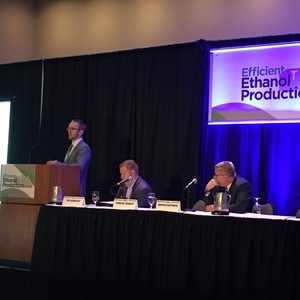CHP brings significant opportunities to ethanol industry

LISA GIBSON, BBI INTERNATIONAL
June 11, 2018
BY Lisa Gibson
During the first-ever Efficient Ethanol Production Seminar preconference at the International Fuel Ethanol Workshop & Expo, conversations focused on all things efficiency, including process heat, dehydration and combined-heat-and-power (CHP), among other topics.
Panelist Bernie Hoffman, CEO of TotalGen Group, started his presentation by telling the audience he thinks CHP will completely change the ethanol industry. Hoffman spoke after Samuel Mussett, regional sales manager for Siemens, on a panel titled “The Energy Efficiency Argument for On-Site Power Production at Ethanol Plants.”
About 24 gigawatts of CHP capacity are installed in the U.S. chemical sector, Mussett said. “But there still exists significant potential.” Ethanol plants are a perfect fit for CHP, he added, mostly because they run continuously. “If you’re running 24/7, efficiency is the drive.” In addition, ethanol plants’ energy loads are large and their energy costs are second only to the cost of corn at dry mill plants, he said.
Mussett talked his audience through the process of implementing a CHP system, from concept to commissioning. First, an ethanol plant must do a screening analysis and work out the economics. Next is project feasibility, a detailed design and project closing, then construction and commissioning. “That’s the fun part, where you actually build something,” Mussett said.
Advertisement
Advertisement
When considering installing CHP, Mussett said a plant should consider whether or not to go off the grid. He added that he’s seeing a shift in that utilities are starting to team up with ethanol plants for power purchase agreements.
In 2004, just 40 percent of today’s CHP capacity in the ethanol industry was installed. In 2008, the U.S. EPA identified the ethanol industry as one of four strategic markets well-suited for CHP, leading to today’s statistic of 25 to 30 percent of ethanol production employing CHP, Mussett said.
The main benefits are emissions reduction and significant cost savings, he said. “Why not do a screening analysis to see if the economics make sense for you?”
CHP makes more sense now than it did when the industry began for a few reasons, Hoffman said. First, the past decade has shown uncontrolled increases in power rates for ethanol plants. Gas turbine efficiencies have increased, carbon markets are maturing and expanding, the importance of carbon intensity and the value opportunities they enable are significant, and there’s uncertainty around grid power, he added. Last, natural gas is cheap and abundant and should remain that way for many years.
Advertisement
Advertisement
In addition, CHP isn’t tied to the uncertainties of the Renewable Fuel Standard, which is always on the minds of people in the ethanol industry, Hoffman said.
The Efficient Ethanol Production Seminar is one of two June 10 preconference seminars at this year’s FEW. The other is the traditional Ethanol 101. The 2018 FEW is being held June 11 to 13 at the CenturyLink Center in Omaha.
Related Stories
Broco Energy on July 17 announced a new partnership with the Massachusetts Port Authority (Massport) to deliver and transition Massport's fuel tanks to renewable diesel across its various facilities.
Shell Aviation, Accenture, and Amex GBT on July 10 announced Avelia is in the process of evolving to an industry solution with independent data hosting and a multi-supplier model helping users access the GHG benefits of SAF.
The U.S EPA on July 17 released data showing more than 1.9 billion RINs were generated under the RFS during June, down 11% when compared to the same month of last year. Total RIN generation for the first half of 2025 reached 11.17 billion.
The U.S. EPA on July 17 published updated small refinery exemption (SRE) data, reporting that six new SRE petitions have been filed under the RFS during the past month. A total of 195 SRE petitions are now pending.
European biodiesel producer Greenergy on July 10 confirmed plans to shut down its biodiesel plant in Immingham, Lincolnshire, U.K. The company temporarily suspended operations at the facility earlier this year.
Upcoming Events










